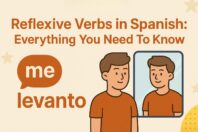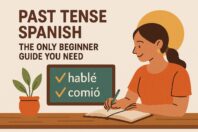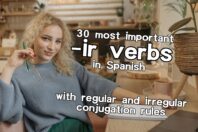Saber vs Conocer: Never Confuse The Spanish “To Know” Verbs Again

Get our free email course, Shortcut to Conversational.
Have conversations faster, understand people when they speak fast, and other tested tips to learn faster.
More infoLet’s be honest. Spanish grammar can be a little confusing at times – especially when there are two verbs that, by definition, mean the exact same thing. This is the case with Saber vs Conocer, which according to the dictionary, both mean: to know.
How, the correct translation is not at all interchangeable, and confusing either one will more than likely result in you saying something completely different, or worse, something pretty weird.
Let’s look at two simple examples of Saber v Conocer in action:
- I know how to speak Spanish – Yo sé hablar español
- I know a great school to learn Spanish – Yo conozco una gran escuela para aprender español
In this post, you’ll learn the subtle differences so that you never confuse both verbs again.
How To Use Saber
Saber is used in relation to knowledge, or skills you have learned such as speaking a language, practicing a sport, cooking, riding a bike, etc.
It is also used to give or ask for information about events, time, and places.
In one word, Saber is used for facts (or what we perceive to be a fact).
- I know how to speak Chinese – Yo sé hablar chino
- He knows how to cook pizza – El sabe cocinar pizza
- We know how to play baseball – Nosotros sabemos jugar baseball
- Do you know who he is? – ¿Sabes quién es él?
- Do you know where the hotel is? – ¿Saben donde está el hotel?
Before continuing, let me remind you how to conjugate the irregular verb Saber (to know) in three of the most commonly used tenses.
| Personal Pronoun | Simple Present
(Know) |
Simple past
(Knew) |
Future
(Will Know) |
| Yo | Sé | Sabía | Sabré |
| Tu | Sabes | Sabías | Sabrás |
| Él, ella | Sabe | Sabía | Sabrá |
| Usted | Sabe | Sabía | Sabrá |
| Nosotros, nosotras | Sabemos | Sabíamos | Sabremos |
| Ustedes | Saben | Sabían | Sabrán |
| Ellos, ellas | Saben | Sabían | Sabrán |
When To Use Saber
1) Facts
- The child knows how to read – El niño sabe leer
- I knew all the answers of the exam – Yo sabía todas las respuestas del exámen
- I don’t know what time it is – Yo no sé qué hora es
- We don’t know the new teacher’s name – Nosotros no sabemos el nombre del nuevo profesor
2) Information
- Do you know how to get to the city? – ¿Sabes cómo llegar a la ciudad?
- Do you know how to use this smartphone? – ¿Sabes usar este teléfono inteligente?
- I didn’t know you had pets – Yo no sabía que tenías mascotas
- We don’t know where the store is. – No sabemos donde está la tienda
3) Skills, knowledge
- My mom knows how to cook the best empanadas – Mi mamá sabe cocinar las mejores empanadas
- They knew how to swim. That’s why they did not drown. – Ellos sabían nadar. Por eso no se ahogaron.
- Do you know how to drive? – ¿Sabes conducir / manejar?
- We know how to play baseball – Nosotros sabemos jugar baseball
How To Use Conocer
Conocer is used to express familiarity with places, people or things.
If you are talking about a country and you’ve been there before, then you know (tú conoces) that city. Or maybe you have meet Alejandro, so you know him (tú lo conoces).
In general, Conocer is used in relation to a previous experience with places, people or things.
- I know that place, It is beautiful – Yo conozco ese lugar, es hermoso
- I haven’t met his parents yet – Aún no he conocido a sus padres
- Do you know the beaches of Venezuela? – ¿Conoces las playas de Venezuela?
- Have you met the new teacher? – ¿Ya conocieron al nuevo profesor?
- Nice to meet you – Un gusto conocerte
Once again, it’s helpful to know how to conjugate Conocer (to know) in the most used commonly Spanish tenses.
| Personal Pronoun | Simple Present
(Know) |
Simple past
(Knew) |
Future
(Will know) |
| Yo | Conozco | Conocía | Conoceré |
| Tu | Conoces | Conocías | Conocerás |
| Él, ella | Conoce | Conocía | Conocerá |
| Usted | Conoce | Conocía | Conocerá |
| Nosotros, nosotras | Conocemos | Conocíamos | Conoceremos |
| Ustedes | Conocen | Conocían | Conocerán |
| Ellos, ellas | Conocen | Conocían | Conocerán |
When To Use Conocer
1) Relationships, or meeting people or pets
- Do you know his brother? – ¿Conoces a su hermano?
- How long have you known each other? – ¿Desde hace cuanto tiempo se conocen?
- You will meet my family soon – Pronto conocerás a mi familia
- I met my father in law yesterday – Conocí a mi suegro ayer
2) Talking about Places
- Do you know the city of Buenos Aires? – ¿Conoces la ciudad de Buenos Aires?
- What places will you meet on your trip? – ¿Qué lugares conocerás en tu viaje?
- Next month, I will meet my grandparents’ house in Spain – El próximo mes, conoceré la casa de mis abuelos en España
- Yesterday we met the new Hindu food restaurant – Ayer conocimos el nuevo restaurante de comida Hindú
3) Things
- Do you know the Harry Potter movies? – ¿Conoces las películas de Harry Potter?
- Do you know this new brand? – ¿Conoces esta nueva marca?
- We don’t know the laws of this country – No conocemos las leyes de este país
- I know that kind of dance – Conozco ese tipo de danza
Let’s do one last comparison to make sure you fully understand the subtle difference between using Saber vs Conocer
| English equivalent | Saber (To know) | English equivalent | Conocer (To know) |
| I know what the capital of Spain is | Yo sé cuál es la capital de España | I don’t know Spain. I’ve never been there | Yo no conozco España. Nunca he estado ahí |
| I know you have a large family | Yo sé que tienes una familia grande | I haven’t met her family yet | Yo no conozco aún a su familia. |
| She knows how to sing | Ella sabe cantar | She doesn’t know any singing teacher | Ella no conoce a ningún profesor de canto |
| I know that he loves wine | Yo sé que él ama el vino | I know an excellent wine bar | Yo conozco un excelente bar de vinos |
Saber vs Conocer Quiz
Add the correct conjugation to the below sentences.
(scroll down for the answers)
- ¿_______ la nueva discoteca? (Do you know the new disco?)
- Yo _____ cuál es su postre favorito (I know what her favorite dessert is)
- ¿ ______ cómo llegar a su casa? (Will you know how to get to his house?)
- ¿Sabes cuál es su talla de zapato? (Do you know his shoe size?)
- ¿Qué países ______ en tu viaje? (What countries will you know on your trip?)
- Mi mamá _____ poner inyecciones, ella puede ayudarte (My mom knows how to give injections, she can help you)
- No _____ a su novia. En realidad, no ___ si tiene novia (I do not know his girlfriend. Actually, I do not know if he has a girlfriend)
- Ellos ______ un buen lugar para ir a acampar ( They know a good place to go camping)
- Nosotros ______ hacer una fogata (We know how to make a bonfire)
- No ______ a mi familia Latina. Por eso voy a visitarlos en mis vacaciones (I do not know my latin family. That’s why I’m going to visit them on my vacation)
Answers
- ¿Conoces la nueva discoteca?
- Yo sé cuál es su postre favorito
- ¿Sabrás cómo llegar a su casa?
- ¿Sabes cuál es su talla de zapato?
- ¿Qué países conocerás en tu viaje?
- Mi mamá sabe poner inyecciones, ella puede ayudarte
- No conozco a su novia. En realidad, no sé si tiene novia
- Ellos conocen un buen lugar para ir a acampar
- Nosotros sabemos hacer una fogata
- No conozco a mi familia Latina. Por eso voy a visitarlos en mis vacaciones



